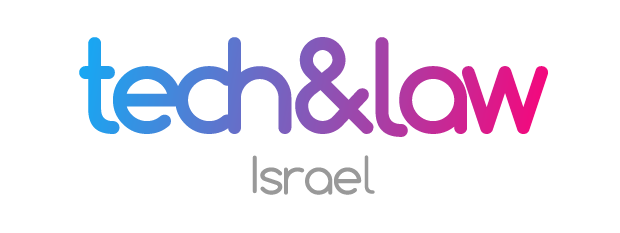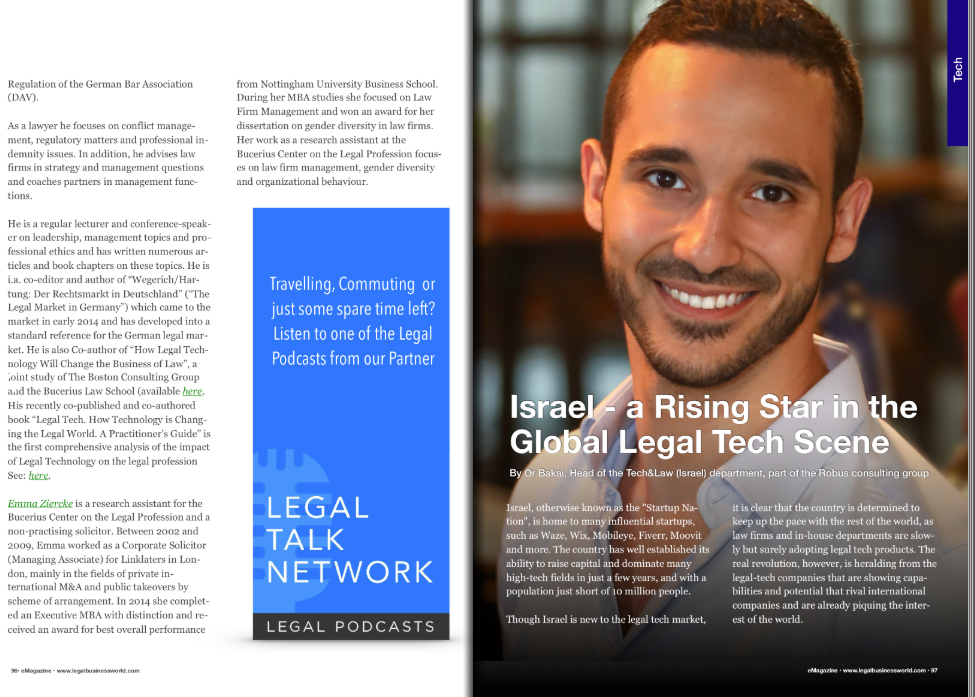
Shany Raitsin
Something is brewing in the Israeli legal field – something extraordinary. Few groundbreaking companies, each with their own unique penchant for innovating in the legal field, have become what one can only call ‘major players’. Among the major players, we can note Lawgeex, LitiGate and LawFlex.
All of these companies have been globally ranked and recognized by international magazines and legal ranking guides. Both Lawgeex and LitiGate were placed within the Category of Global-wide LawTech Vendors, but they were put into separate sub-sections; Lawgeex was ranked in the section of Transaction Management (Contract Analysis), while LitiGate was ranked in Litigation & Dispute Resolution. LawFlex was ranked in the highly competitive category of Alternative Legal Service Providers, specifically in the sub-section of Global-wide Flexible Legal Staffing. LawFlex was found to be ranked amidst ALSP giants such as Elevate, Axiom, KPMG, Peerpoint, and more.
Each of the companies started out in Israel, and have since grown in terms of personnel and in terms of global expansions:
- LawFlex, for instance, has recently announced its arrival in Latin America, and Western Europe (France and Germany)
- Lawgeex has since expanded its artificial intelligence (AI) capabilities to cover most of the mundane contractual obligations of an attorney, allowing lawyers to delegate more time to bigger and more important projects.
- Litigate has also expanded its legal-tech capabilities to devise tools for organizing case assessments, identifying key actors in a case, and a networking feature that allows lawyers the opportunity to delegate, discuss, and direct in real time.
Lawgeex is a prime example of how legal-tech can be leveraged to skyrocket workplace efficiencies. A report conducted by Forrester revealed that using the AI-enabled solutions provided to companies via LawGeex, lawyers were able to reduce the time they spent reviewing complex contracts by a whopping 75%. This opened up opportunities to “recapture productivity”, and to delegate their time to more complex tasks requiring a strategic (and distinctly human) approach. Certainly, LawGeex’s AI solutions can’t mitigate the load of every single task on a lawyer’s plate, but what it does cover as of today is still quite substantial.
To put it into perspective, the elimination of unnecessary time spent reviewing lower-complexity contracts results in 6,500 hours saved over a three year period for a given organization. This conversation to a present value of nearly $450,000 US over three years. Now, when you factor in savings on training and onboarding and the direct cost avoidance of additional hire, savings climb to around $625,000 US.
There is no denying that legaltech is here to stay, and Litigate is laying down its roots in this niche part of the legal sector. LitiGate summarizes its offerings by calling itself an “AI-Powered Litigation Lifecycle Platform for Litigators who mean business”. It helps mitigate the tediousness of case exploration and “supercharges” analysis capabilities. As LitiGate puts it so aptly on their website, they are the ones who “do the heavy lifting, automating manual tasks to maximize your team’s productivity and free lawyers up to focus on more meaningful work”.
LitiGate has case studies listed on its site that illustrate just how powerful their tools are; one of the most notable case studies was conducted with Baker McKenzie, a well known multinational law firm. The case study focused on an issue surrounding complex arbitration, and it’s safe to say that the study highlighted some of LitiGate’s best attributes. The team at Baker McKenzie were impressed by the specialized search tools and “sifting” capabilities of the AI, which meant that the extraction of the information they were looking for was picked up in a fraction of the time it would have taken the legaltech. The team theorized that in this case alone, LitiGate’s solutions saved them dozens of hours. Lawyers were even able to add comments to the specific chronologies developed for their timeframes, actors, tags, document categories, etc. It’s organization and case analysis like we’ve never seen before.
Last, but certainly not least, LawFlex has proven itself to be a force to be reckoned with in the competitive sphere of ALSPs (Alternative Legal Service Providers). Nowadays, it seems as though every major law firm and global network is developing an Alternative Legal Service branch, ostensibly because many in the industry are catching on to the “restructuring” that has been precipitated by COVID-19, and a demand for more flexible legal work. LawFlex was one of the first to foray into the ALSP sector, and quickly made a name for itself as an ever-growing network of top lawyers. Their pool of qualified, highly vetted attorneys has grown to over 600 as of 2021. Their services include – flexible legal staffing, legal ops support, legal process outsourcing, and more. It is, essentially, a one stop shop for legal services.
The rapid expansion of LawFlex outside of Israel is noteworthy as well, with some of its offices located in France, Germany and Latin America. The tailor-made approach that LawFlex has with regards to its legal staffing methods are exemplary, and indicative of the changes happening in the legal industry. Businesses are increasingly emphasizing flexibility and efficiency with regards to legal tasks, which is what makes LawFlex’s staffing solutions so attractive.
To sum up – It’s clear that these three Israeli companies are legal trailblazers in their own ways. They are paving the way for future generations of tech-enabled, flexible, highly efficient lawyers.







